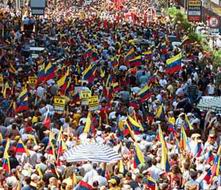Venezuela opposition embroils G-15 Summit in Caracas
 At least 30 wounded in clashes between the National Guard and protesters claiming for a referendum on president Chavez’s recall.
At least 30 wounded in clashes between the National Guard and protesters claiming for a referendum on president Chavez’s recall.
At the time parts of Caracas were a battlefield, 15 leaders from developing countries discussed common policies.

At least 30 were Friday wounded when Venezuela’s National Guard clashed with thousands of protesters demanding a recall referendum against President Hugo Chavez Frias in Caracas. The action took place a few meters away from the hall where 15 Third World leaders from Asia, Africa, Latin America and the Caribbean were holding a Summit to consensuate common policies against poverty and underdevelopment.
The political mood in Venezuela had been again agitated by the negative of the National Electoral Council to approve at least 1.5 million signatures collected by the opposition to fulfil with legal requirements to revoke Chavez mandate. Council authorities say objected rubrics were fake and part of a fraud. Some Army officers dennounced their names and signatures had been falsified by organizers. Chavez has condemned the referendum petition as riddled with fraud and accuses his foes of plotting to overthrow him with U.S. support. Washington denies this.
The clashes broke out as hundreds of National Guard troops backed by armored vehicles barred the path of the demonstration by thousands of opposition supporters advancing toward the summit venue in Caracas. National Guard troops fire round after round of tear gas canisters, scattering the demonstrators, who threw stones. Television footage also showed the soldiers firing shotgun pellets, mixed with images of a smiling Chavez embracing Brazil’s President Luiz Inacio Lula Da Silva and Argentine Head of State, Nestor Kirchner.
At the meeting, Iranian President Mohammed Khatami stayed in calm. Demonstrators had planned to try to hand over a message to the foreign leaders explaining their campaign to secure a recall vote against Chavez. They say he is ruling the world's No. 5 oil exporter like a dictator.
In the meantime, former army officers said the “mood was similar than the one in April 2002”, when a military coup ousted Chavez for 48 hours. Such declarations were considered as a provokation against constitutional authorities. The heads of state of Brazil, Argentina, Iran, Zimbabwe and Jamaica were attending the summit of the Group of 15 developing nations. When the clashes broke out, Chavez was holding private meetings before the scheduled opening of the meeting.
As political tensions rise over the disputed recall vote, international observers and foreign governments have urged the National Electoral Council to guarantee speed and transparency in its check of opposition pro-referendum signatures. As the Council keeps on delaying a final ruling, the strained relations between both sides may turn into violent actions as usually happened in Venezuela’s recent history.
Hernan Etchaleco
Subscribe to Pravda.Ru Telegram channel, Facebook, RSS!


